11 Marketing Tools for Small Businesses in 2026

Sorry, there were no results found for “”
Sorry, there were no results found for “”
Sorry, there were no results found for “”
Running a small business requires an insane amount of dedication and effort to keep a small business successful.
Statistics show that there were 31.7 million small businesses in the U.S. in 2020. At the same time, the U.S. Bureau of Labor Statistics claims 82% of small businesses survive only 1 year, 50% make it to 5 years, and just 35% last 10 years or more.
As a small business owner, hopefully, you can increase your chances of success by leveling up your marketing efforts with digital marketing tools.
In this article, you’ll learn the benefits of using marketing tools for small businesses, key features to look for, along with ten marketing software to help you plan, manage, and track your marketing strategies and campaigns.
It feels like a new marketing tool comes along every week. And data from Statista shows the martech industry worldwide was worth $344.8 billion in 2021. Knowing this, it is no surprise that 96% of marketers have used a marketing automation platform.
As a small business owner, you should always look for ways to improve your business. Just like you would use creative methods to find a new employee, you need to think outside the box to improve your marketing.
And if most marketers use marketing automation platforms, there is certainly something to take away from that. Let’s look into why you should really be using marketing tools in your small business.
Working nonstop can sometimes make you and your employees feel like you’re on a never-ending hamster wheel and can’t find your way off. And truthfully? You just might be.
It can be hard to step back and look at the bigger picture whenever you are extremely busy with different projects. Are the strategies that you have implemented for marketing working? Is there something you can put into play that will free up your time?
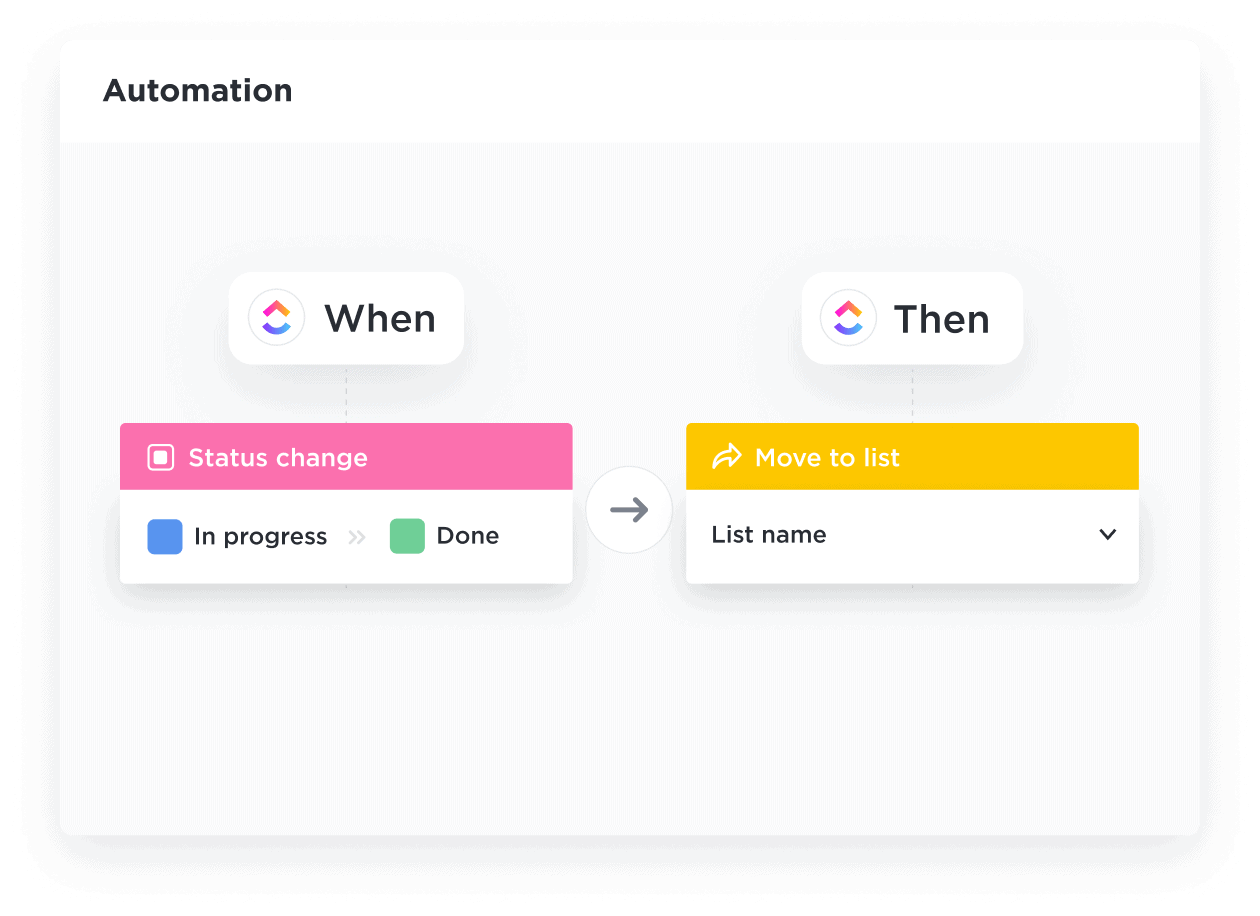
Digital marketing tools that will automate workflows are certainly something that your marketing staff will be grateful for.
Instead of manually completing every step of a process, good digital marketing tools that will automate workflows will free up their time for bigger and better projects. With workflow automation, employees will benefit from streamlined communication, high-quality work since processes will be less prone to human error, and increased accountability.
All of these benefits will contribute to the overall growth of the department and, therefore, the company.
Marketing is all about connecting people. As a small business owner, you may look for ways to grow your following and reach a larger audience.
Statistics show that Facebook, Instagram, and Twitter lead the pack as the most common social media platforms, so you will certainly want to reach those audiences through your marketing team.
With the right marketing tools, your team can quickly put a plan in place to grow your small business audience through social media.
Try out time tracking tools for small businesses!
About 68% of consumers say they are willing to pay more for products and services from a brand that offers good customer service experiences. However, the only way to create a good customer service experience is to embrace customer feedback.
As a small business, you and your marketing team should seek out marketing tools to help you collect customer feedback so you can improve your small business every step of the way.
As a small business, you must measure objectives for your marketing tools and campaigns so you know what works and doesn’t work for you. And with the right marketing tools, you’ll be able to track your goals, measure progress, and maximize your marketing efforts.
As you implement new marketing tools in your small business, be certain that the tools you choose allow you to track your goals. If your end goal is to increase website traffic, for example, define how much traffic you would like to see over a specific amount of time.
Then, for each new tool you implement, set goals and timelines to measure the tool’s success in your business.
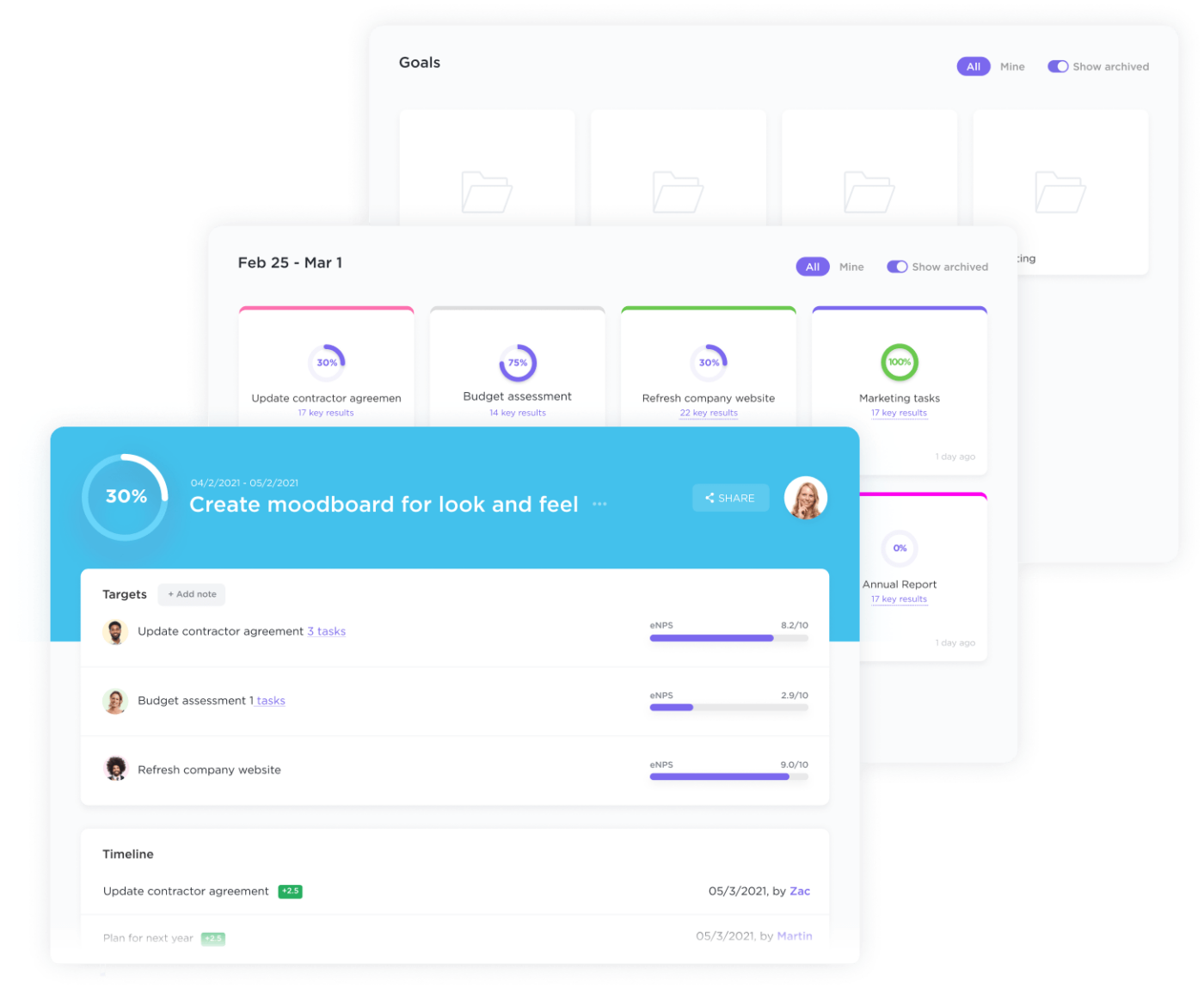
The marketing tools you choose for your small business should also allow you to measure your progress. A great way to do that is to establish key result areas for marketing in your small business. Setting marketing OKRs and tracking metrics is another way to measure the success of your marketing efforts and tools.
Marketing tools let you measure and keep track of a plethora of things:
It’s easy to fall into the hustle and bustle of getting tasks done and turning them in before ( or right on…) the deadline. As a small business, you probably have a lot of employees wearing multiple hats to keep up with the growing demands of your business.
But what happens if someone on the team forgets about a project? Or what if there was a main component of the project that the team didn’t even realize they should be doing?
As a small business owner, you should seek ways to improve productivity and realistic workloads. This is where a marketing project management tool like ClickUp comes into play.
You can use ClickUp’s Project Management Review Template for your team to decide whether to move forward on a project or not. This template helps your team see if they are getting the expected results back and allows them to move forward with the next step of the project.
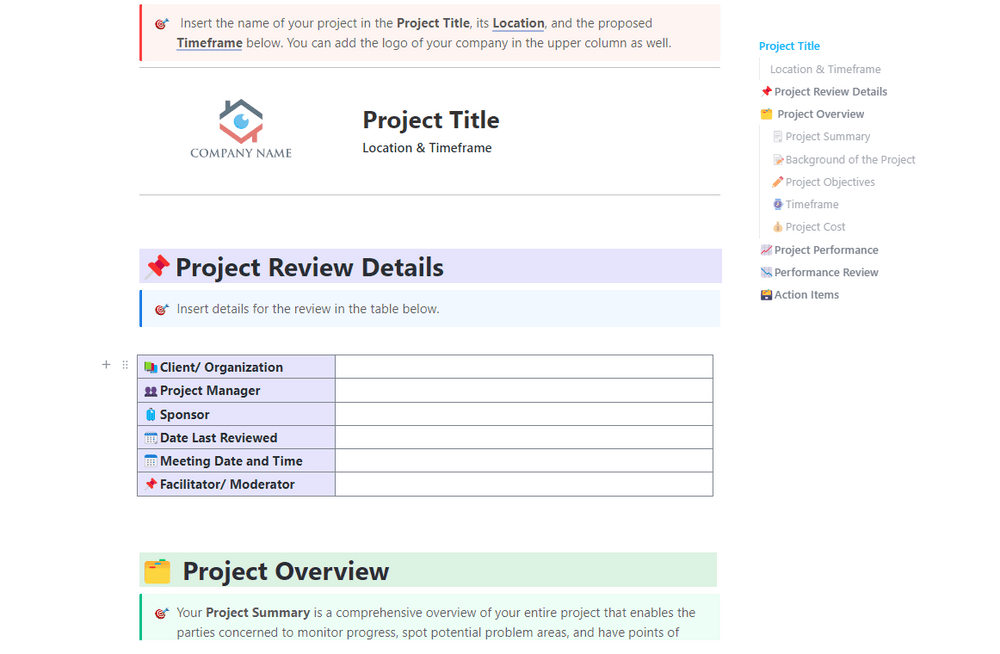
Instead of the team trying to remember everything that must be done, a functional project management tool like ClickUp can help them stay on top of tasks, measure progress, and ensure nothing falls through the cracks. This will ensure smooth business operations and help manage project budgets more effectively.
Choosing the right marketing tools for your small business may seem a little overwhelming, but we’ve done the research and made it easier for you. Check out these 10 marketing tools that small businesses can’t miss out on.

Need a better way to manage your projects and communicate with your team?
Then, this tool is for you.
With a flexible and functional project management tool like ClickUp, your marketing team will be fully equipped with the tools you need to effectively plan, manage, and track your projects, marketing campaigns, and more. As your business grows, you’ll need a project management tool to help your marketing teams monitor marketing initiatives, and employee workload, and oversee your projects on a higher level.
This is what makes ClickUp one of the best tools for businesses—it’s flexible, functional, and scalable. It’s built for individuals and teams of all sizes across different industries and offers hundreds of advanced project management and collaboration features to help manage simple to complex workflows.
And because the platform is completely customizable, you and your team can build ClickUp to fit your workflow, preferences, and project needs, and adjust it as your business scales. ?
Want to streamline your work even further? Integrate ClickUp with over 1,000 work apps and other essential marketing tools for a seamless workflow and to keep all your work in one centralized place.
Want to consolidate tools and set your small business up for success in 2026? Check out our step by step playbook
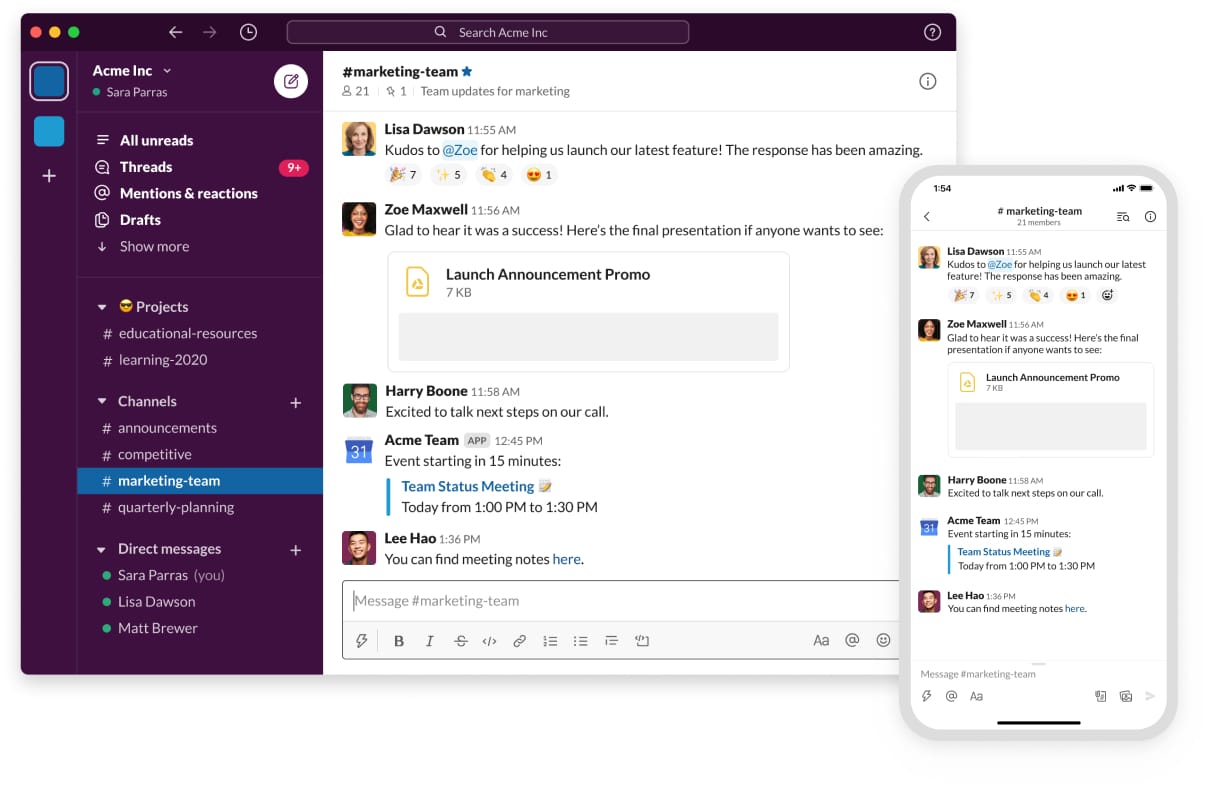
Project management involves talking with your co-workers, and Slack helps you do just that. Slack is a group messaging or team collaboration app that simplifies business communication.
With this app, you and your small business will be able to have open discussions, private groups, and direct messaging, as well as deep contextual search and message archiving, and file sharing. Instead of calling each other, sending emails, or popping into each other’s offices, this messaging app will enable you to message each other and quickly resolve issues throughout the day.
Bonus: AI tools for small businesses

Sendinblue is a marketing communication software that performs tasks related to managing marketing automation, email campaigns, transactional emails, and SMS messages.
This tool can help small businesses send out newsletters and mass communications digitally.
Sendinblue provides advanced, real-time reporting that will be super helpful for you to track your small business metrics.
With the possibility to add unlimited contacts to your database, it is an excellent option for marketing communication that will grow as your company grows.

Mailchimp is an all-inclusive marketing platform that helps small businesses market smarter to grow faster.
This tool is great for small businesses as it will help you automate workflows within your marketing department.
It is AI-powered and helps you send marketing emails and automated messages, create targeted ad campaigns, build landing pages, send postcards, facilitate reporting and analytics, and sell online.

Hootsuite is a social media and marketing management tool. This app is great for a small business as it will substitute a lot of hands-on work in your social media postings.
In this app, you can schedule posts across multiple social networks, manage organic and paid social content together, keep track of customer conversations, and gain actionable real-time insights from social media to make critical marketing decisions all from one place for your small business.

Canva is a graphic design tool that facilitates creating graphics.
If you and your marketing team for your small business are new to creating graphics, this program is easy-to-use and all-inclusive in the visuals you can create.
With this app, you can create unique content for social media, presentations, invitations, posters, brochures, and business cards, among others. Instead of having several different apps for each visual, everything is centralized in one location, making this an excellent tool for your small business.
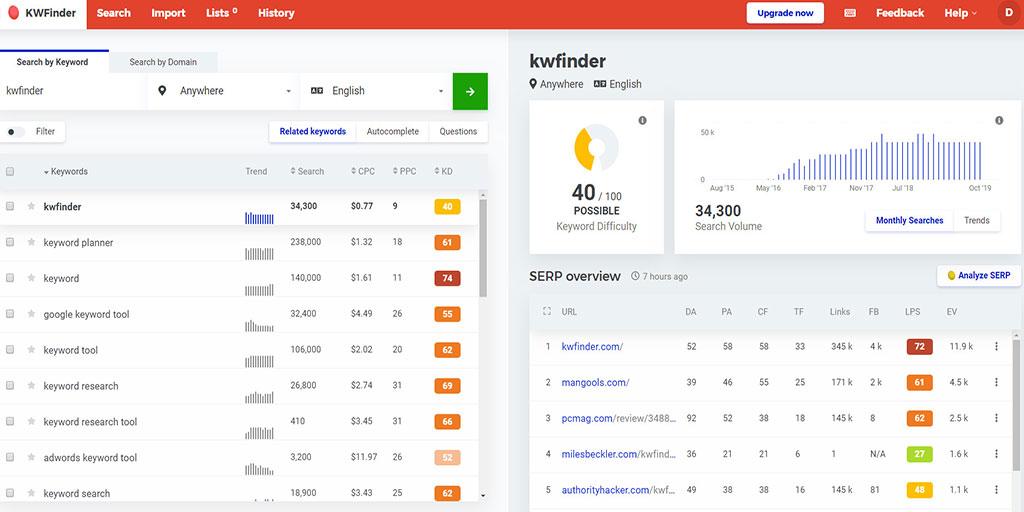
KWFinder is a keyword research tool for search marketing.
It finds long-tail keywords with low SEO difficulty. It provides an index value for SEO difficulty based on various ranking factors and insight into pay-per-click advertising. As your small business grows, you will want to be able to track the best keywords for SEO, so this tool will be an excellent option.
KWfinder is also great for generating ideas and fresh inspiration for new projects. So, whenever you or your marketing team feel stagnant, this tool can get new ideas spinning quickly.
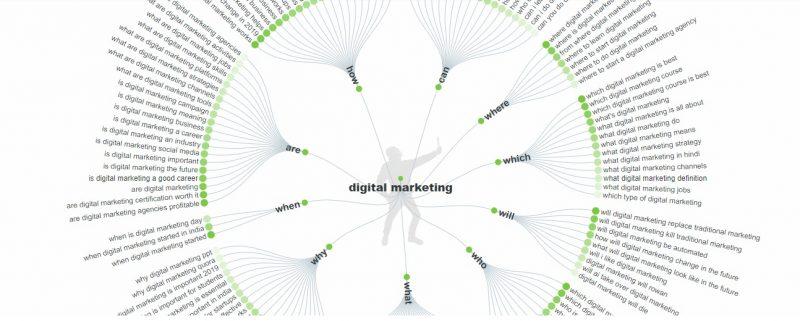
AnswerThePublic is a tool that provides autocomplete data from search engines like Google, then provides useful phrases and questions people ask around your keyword.
It’s a spectacular way for your small business marketing team to gain insight into what readers are looking for, then turn around and use it to create fresh and useful content and products.
When you or your team are low on ideas, this search feature is a great way to get inspired. The free version offers up to three free searches a day, so you easily check it out and see what it’s all about.
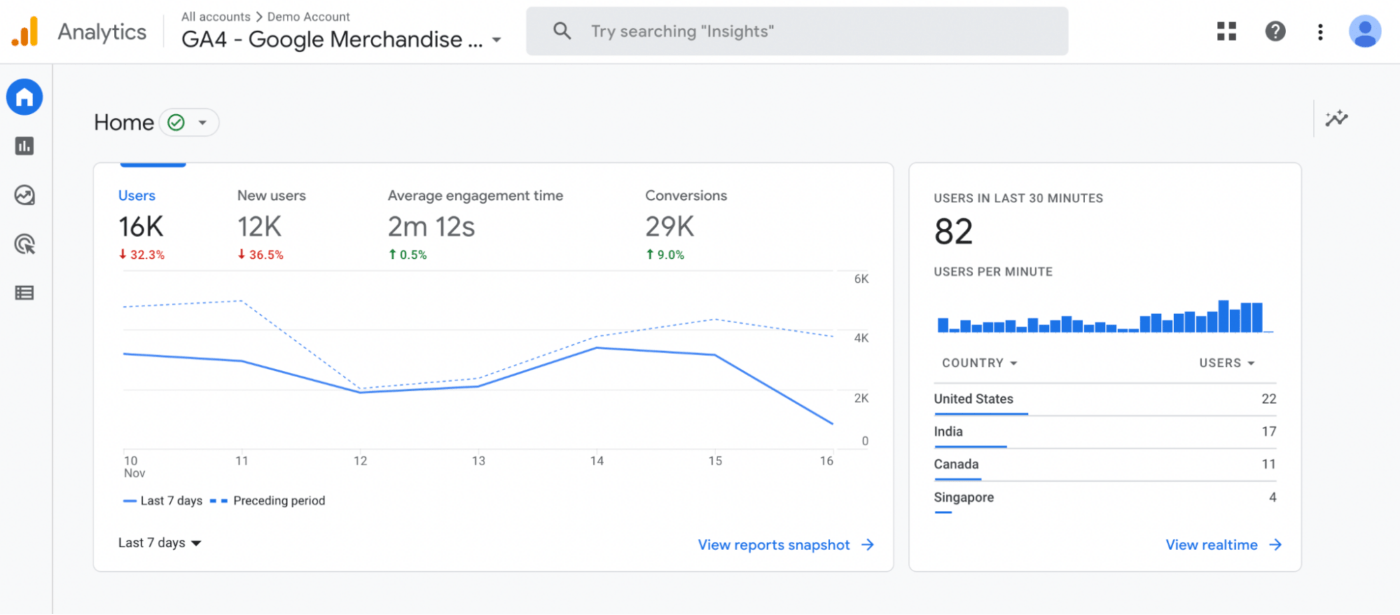
Google Analytics is an analytics service that provides statistics and tools for search engine optimization and marketing purposes. This tool is free to anyone who has a Google account.
For a small business, Google Analytics is helpful in tracking website performance and collecting data from visitors. It can also help you measure whether or not marketing campaigns were successful and different patterns in user engagement.
If you decide to implement any analytics in your marketing tools, this should be one of your top choices to grow your small business.
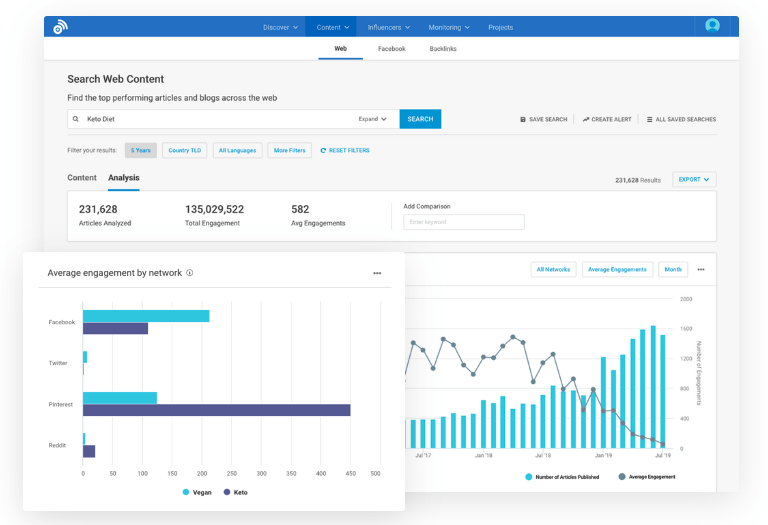
BuzzSumo is a platform that will help you discover the best engagement, content, and outreach opportunities across social media and search engines. Through this tool, you can discover new keywords, trending stories, customer questions, and content success.
This is a reliable way to figure out what’s popular or about to be a hot topic on social media so you can implement it into your small business marketing strategies. Tracking these features is important because it will provide further insight into what does or doesn’t work for your brand, so you won’t want to miss out on this tool for your small business.
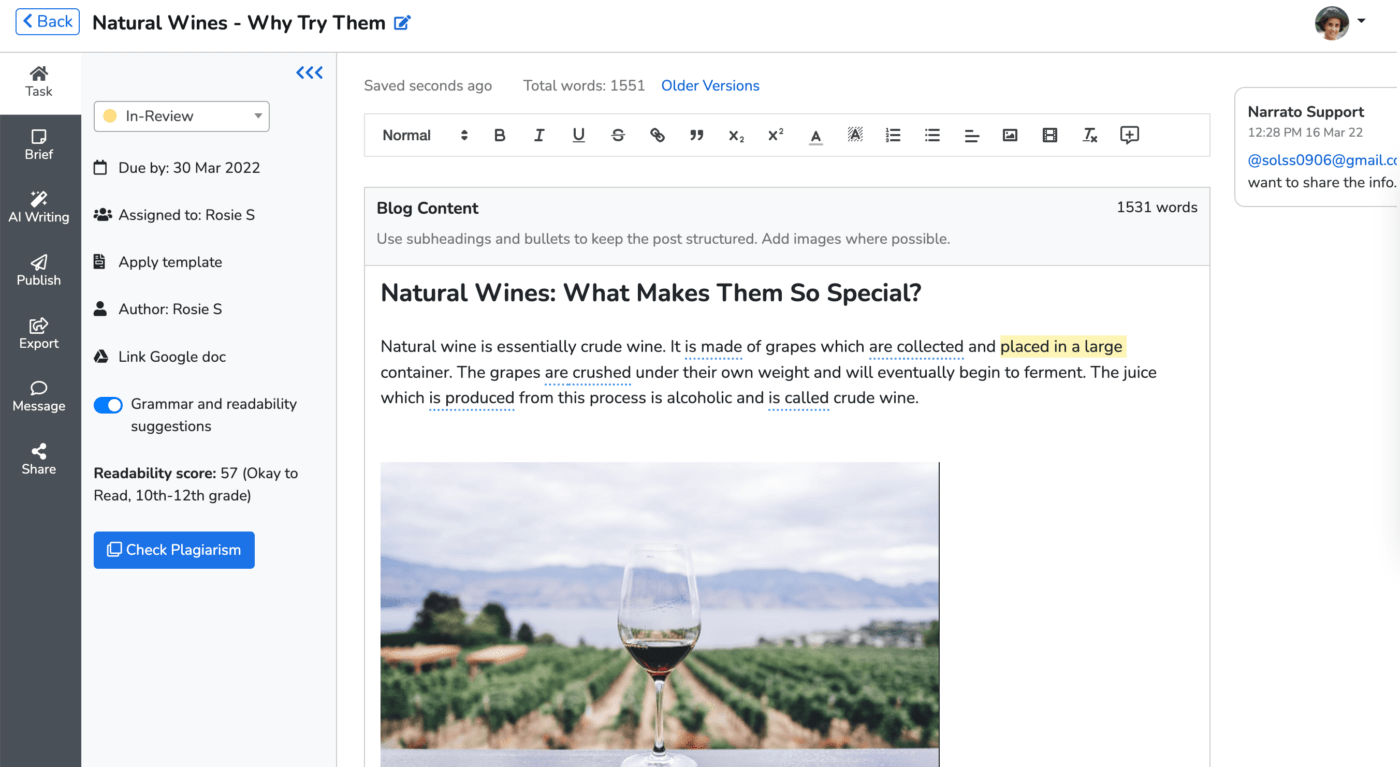
Narrato Workspace is a content creation, collaboration, workflow, and project management tool. It also serves as a content writing platform for ordering website, blog, and SEO content. On this platform, you can post jobs and hire quality-vetted freelance copywriters and content writers for your small business needs.
So, if you find yourself in a bind for content creation, you should check out this tool. With the idea management system, customizable templates, and the possibility to connect to freelancers, your small business will certainly benefit from this tool.
Bonus: Check out 7 Free Content Writing Templates for Faster Content Creation
With so many options out there, it can take a lot of work to know which ones are worth investing time and money in and which ones you should pass on. When looking for small business marketing tools, here are some key features every marketing tool should have.
A program may be spectacular and have many great features, but if it isn’t user-friendly, you should probably pass on it.
Regardless of what the tool promises, you should be able to access it and easily learn how to use the app or the website. Additionally, if a tool provides great how-to and tutorials with snapshots of navigating the tool, that’s a great bonus.
The last thing you want to do is invest in a tool only to realize then how much time you will have to put into learning how it works.
Whatever program you decide to use should be practical.
Always weigh out the tool’s practicality for you and your team’s use versus the cost. Decide if the features are actually something you will use or if they are just an added benefit that you do not need or are irrelevant to your needs.
If the practicality and use do not outweigh the costs, then you should continue your search for marketing tools that are good for your use.
Your marketing tools should be flexible enough to accommodate your current needs and adjust with you as your business scales. So when searching for cutting-edge tools, look for tools that offer customization options and a wide range of features that can help with simple to complex tasks.
In other words, don’t invest in a tool that only resolves your issues now. Instead, look for a long-term solution that can support your current and future business needs.
Marketing tools are something that every small business should implement. Free up time for your marketing team to focus on bigger and great projects.
If you take away anything from this list, really consider the features of each tool and try to find one that checks off the most boxes so your team relies on fewer tools. If you’re still missing some critical features, make sure the tool can at least integrate seamlessly into your preferred platform.
ClickUp can integrate with more than 1,000 different applications through Zapier. In addition, Zapier handles the automatic transfer of data so you do not have to worry about each little step of the way.
Choose the right marketing tool to reach new customers, achieve and crush your marketing goals, and take your small business to a new world of efficiency.

Guest Writer:

Freya Laskowski is an SEO consultant that helps brands scale their organic traffic with content creation and distribution.
She is a quoted contributor in several online publications, including Business Insider, Fox Business, Yahoo Finance, and the Huffington Post. She also owns CollectingCents, a personal finance blog that she grew from the ground up.
© 2026 ClickUp